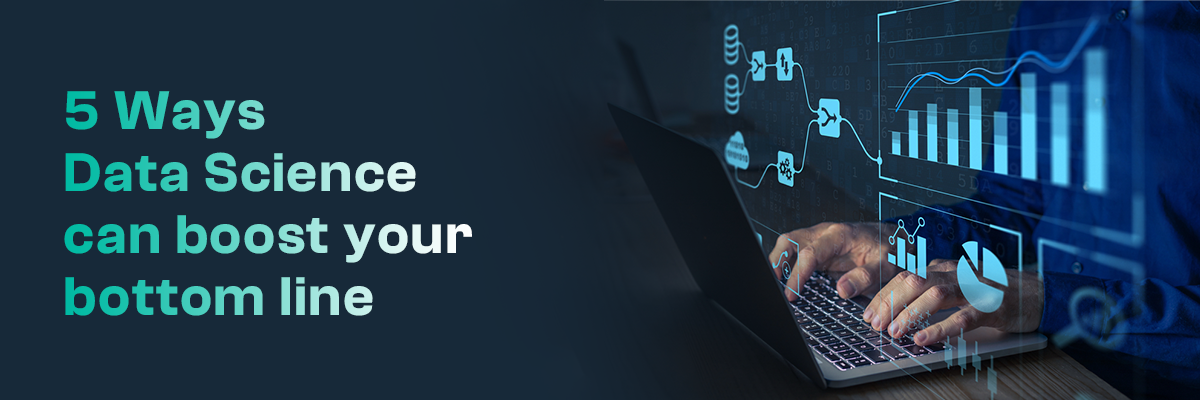5 Ways Data Science can boost your bottom line

The volume of data that we produce on a daily basis is astronomical. To give you an idea of the scale, it is around 120 zettabytes every year, which is equivalent to 328.77 million terabytes per day.
There is an overwhelming amount of data floating around, and companies are having a hard time finding ways to make sense of it all. Problems arise not just with data collecting, but also with translating it into insights that have a direct bearing on financial performance.
The field of data science is necessary for both the management of data and the extraction of insights from it. In times of information overload, it directs businesses toward profit-driven, educated decisions, offering a clear picture of the path ahead.
How Data Science Can Propel Your Business Forward
Data science is the process of collecting, analyzing, and interpreting digital data to make evidence-based decisions. For businesses, this involves predicting customer behavior, identifying market trends, and gaining insights into operational efficiencies.
By using predictive modeling, you can predict what will happen in the future by looking at what has happened in the past. This lets you plan for things like changes in the market, consumer preferences, and possible business problems.Through optimization, businesses can fine-tune marketing, streamline operations, and allocate resources effectively for maximum impact.
The strategic application of data science contributes positively to a company’s financial performance, including aspects such as increased operating margins and improved overall business profitability.
5 Ways Data Science Can Supercharge Your Company’s Profitability
- Improved Decision-Making:
One of the primary benefits of using data science in your business is its ability to make more informed and strategic decisions. Data-driven insights allow you to analyze past performance, identify patterns, and predict future trends. By
You can optimize decision-making processes by leveraging advanced analytics, machine learning, and predictive modeling.
For example, in retail, analyzing customer purchase history and behavior can help in inventory management, ensuring that popular products are adequately stocked.
This prevents overstocking or stockouts, ultimately improving customer satisfaction and increasing sales. In manufacturing, predictive maintenance models can anticipate equipment failures, minimizing downtime and reducing maintenance costs. - Personalized Marketing and Customer Engagement:
By collecting and analyzing customer data, such as preferences, purchasing history, and online behavior, businesses can create personalized marketing campaigns and tailored customer experiences.
Personalized marketing increases the relevance of your messages, leading to higher engagement and conversion rates.
For instance, e-commerce platforms can use recommendation algorithms to suggest products based on a customer’s browsing and purchase history, enhancing the likelihood of making additional sales.
This targeted approach improves the efficacy of marketing expenditures while also improving customer satisfaction. - Optimized Operations and Cost Efficiency:
Through the analysis of operational data, businesses can identify inefficiencies, bottlenecks, and areas of waste. Predictive analytics can also be employed to forecast demand, allowing for better resource planning and inventory management.
For instance, logistics companies can use data science to optimize delivery routes, reducing fuel costs and delivery times. In manufacturing, data-driven insights can lead to more efficient production processes, minimizing waste and maximizing output.
These improvements in operational efficiency directly contribute to cost savings and increased profitability. - Risk Management and Fraud Detection:
Whether it’s managing financial risks or detecting fraudulent activities, advanced analytics and machine learning algorithms can analyze vast amounts of data to identify anomalies and patterns associated with potential risks.
In finance and fraud prevention, advanced analytics and machine learning analyze lots of data to find unusual patterns that might signal risks. For instance, in finance, models look at credit history and spending habits to assess credit risks.
In e-commerce, algorithms spot odd purchasing behavior to prevent unauthorized transactions. By staying ahead of risks, businesses safeguard their assets, reputation, and financial well-being. - Enhanced Customer Retention and Loyalty:
Acquiring new customers is essential, however retaining existing customers is equally important for sustained profitability. Data science can help businesses understand customer behavior, preferences, and satisfaction levels. By analyzing customer feedback, social media interactions, and other data sources, businesses can identify areas for improvement and enhance customer satisfaction.
For example, a retail business can offer personalized discounts or exclusive deals to long-term customers based on their purchase history. Through the implementation of data-driven customer retention strategies, organizations have the ability to decrease retention rates, and ultimately improve financial performance.
How You Can Get Started with Data Science
Your investigation starts with identifying both internal and external data sources. Use market trends, consumer feedback, and other pertinent data points in addition to conventional sales numbers. You will be able to form more nuanced conclusions with this entire picture, which will provide you a broader context.
To manage and analyze the massive volumes of data involved, a solid data infrastructure must be built. Think about making use of affordable and scalable cloud systems. As a result, you can keep expenses down while easily expanding your infrastructure to meet changing demands.
Without a solid crew, no data science adventure is ever finished. When assembling your team, make sure they have strong technical skills in data analysis and manipulation and also have a good grasp of your company’s objectives and the industry as a whole. Your data-driven initiatives will be both practical and in line with your long-term goals with this blend of technological expertise and business acumen.
To ensure a smooth progression throughout your data science operations, partner with Jet2 Travel Technologies, an industry trailblazer in data-centric solutions.
With our wide range of services and deep knowledge, we can help you use data to your advantage to achieve growth and success.
Get in touch with Jet2 Travel Technologies right away to turn your data into insights and smart choices that you can use to grow your business.


